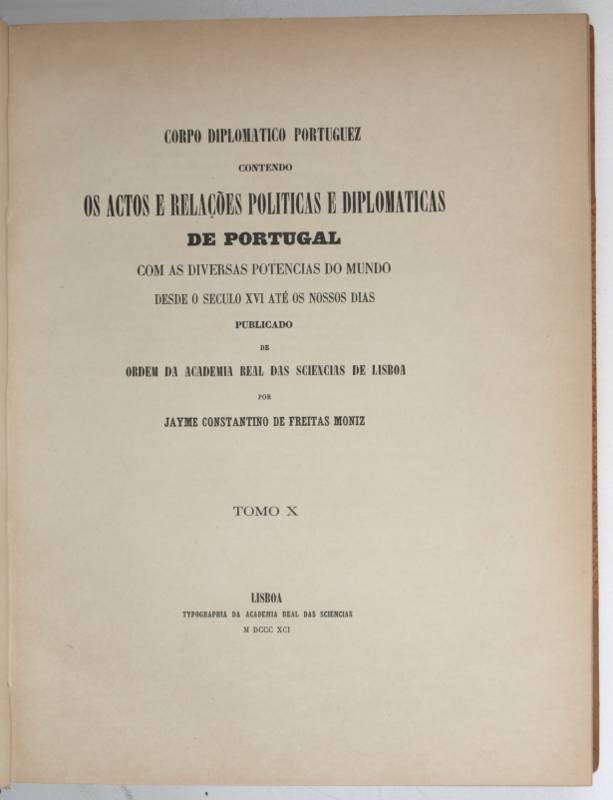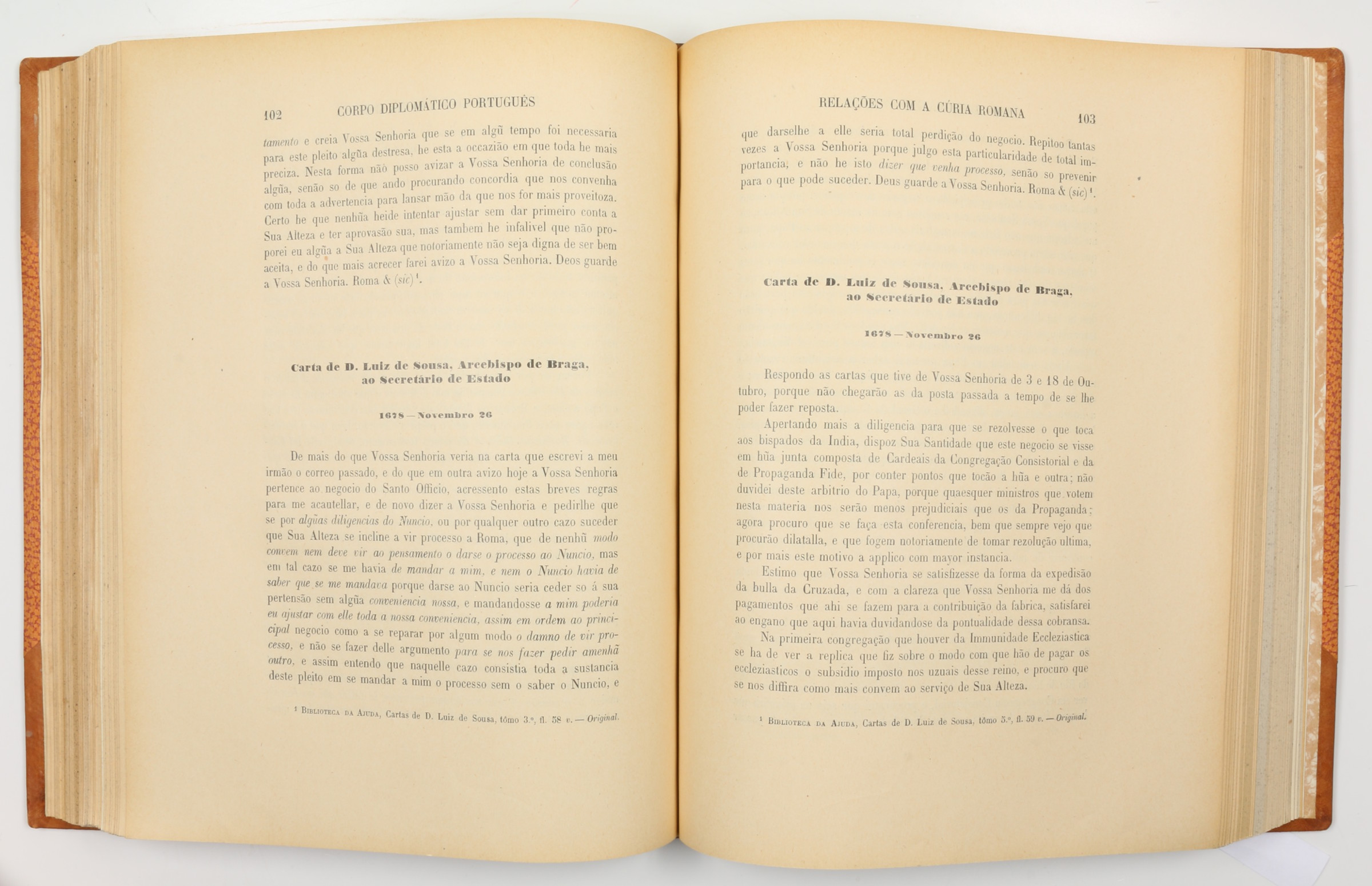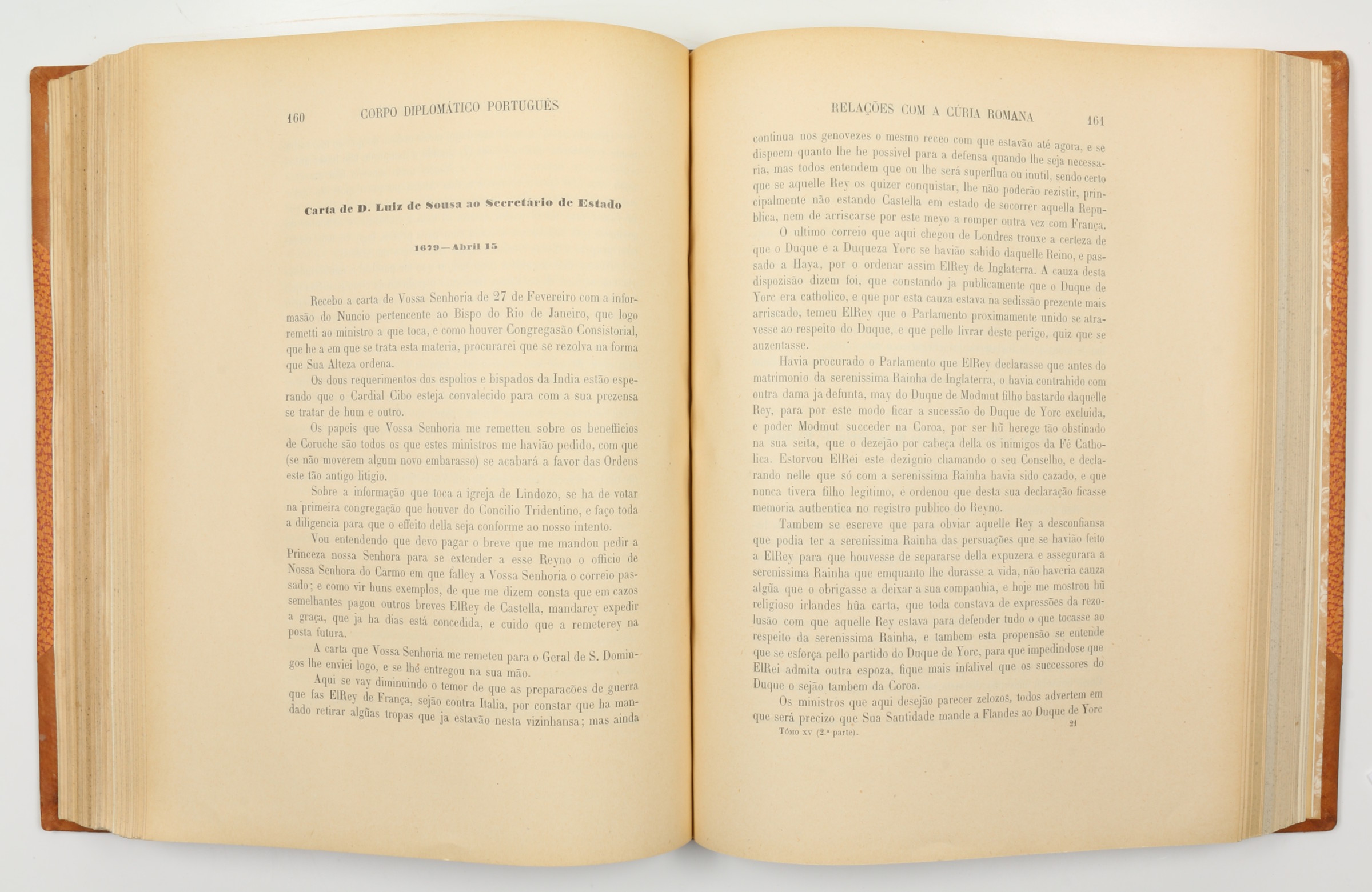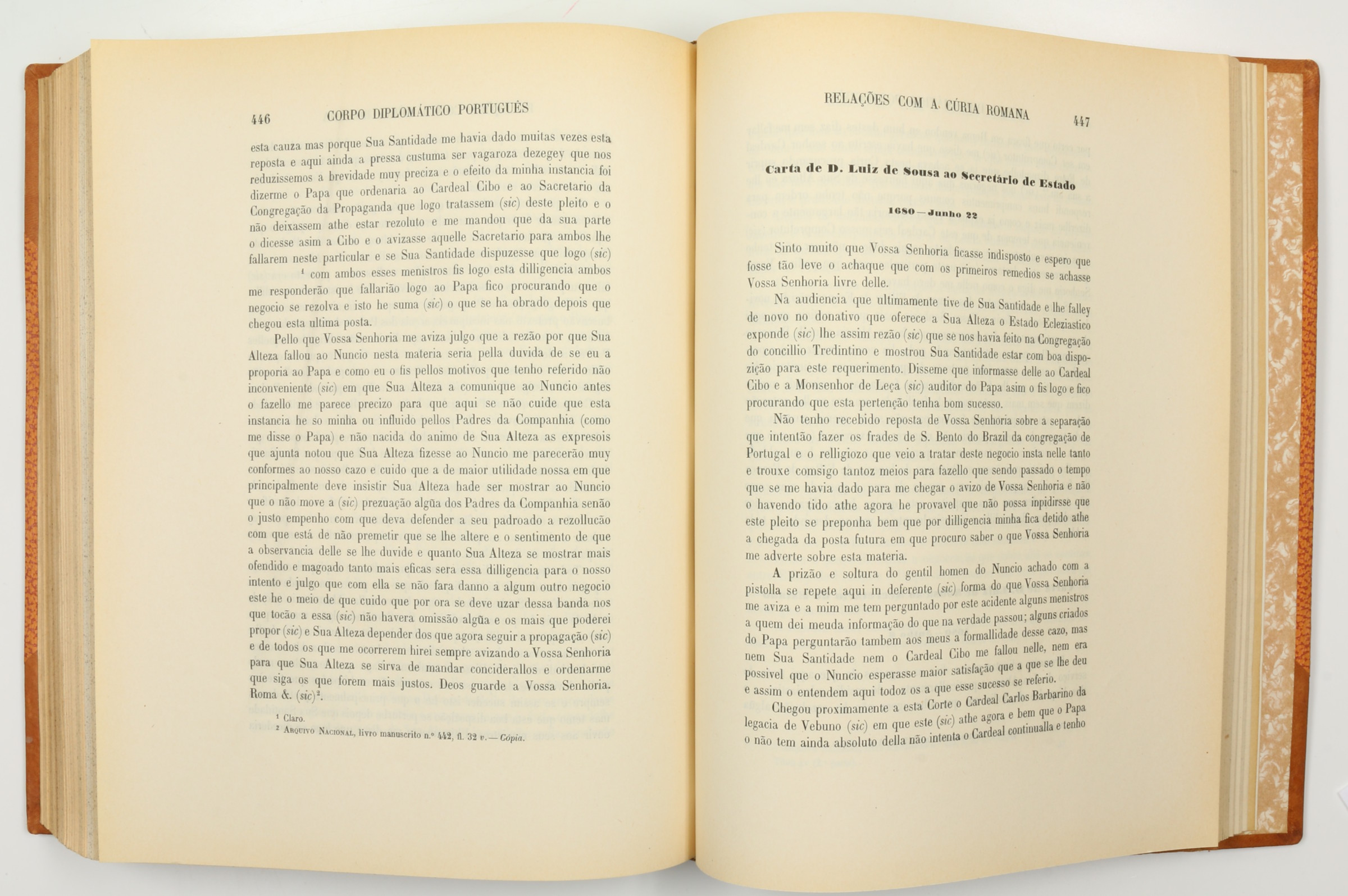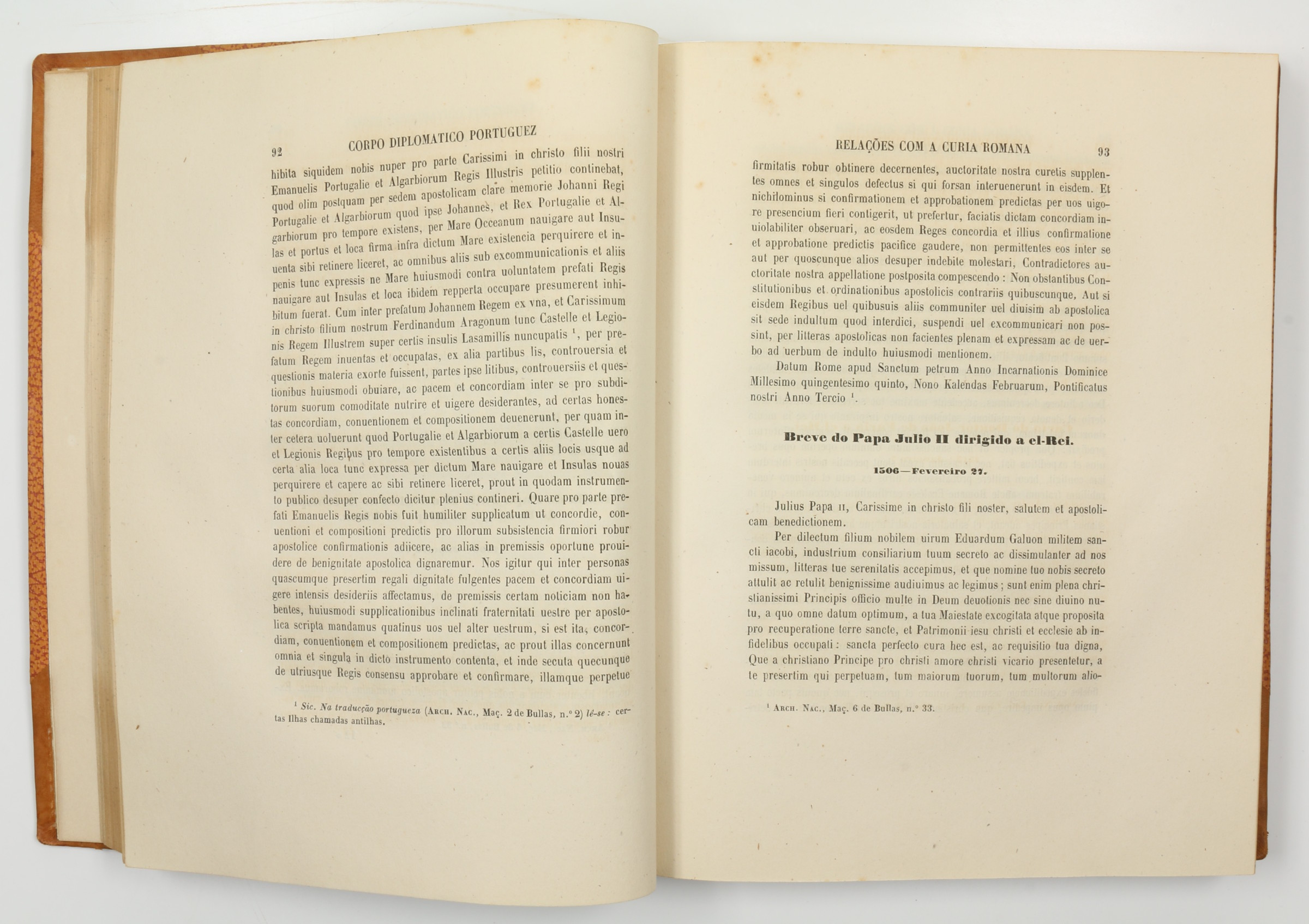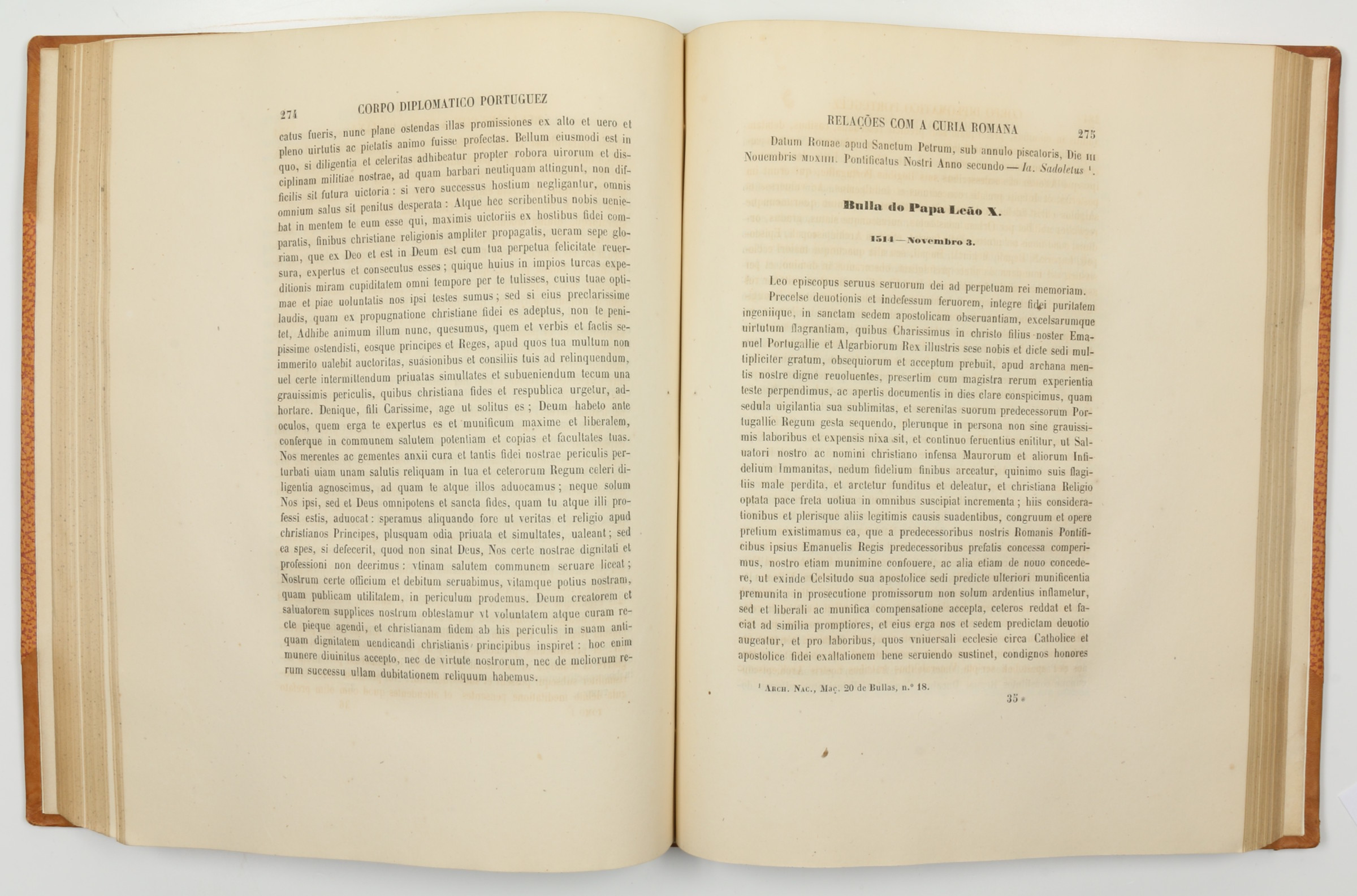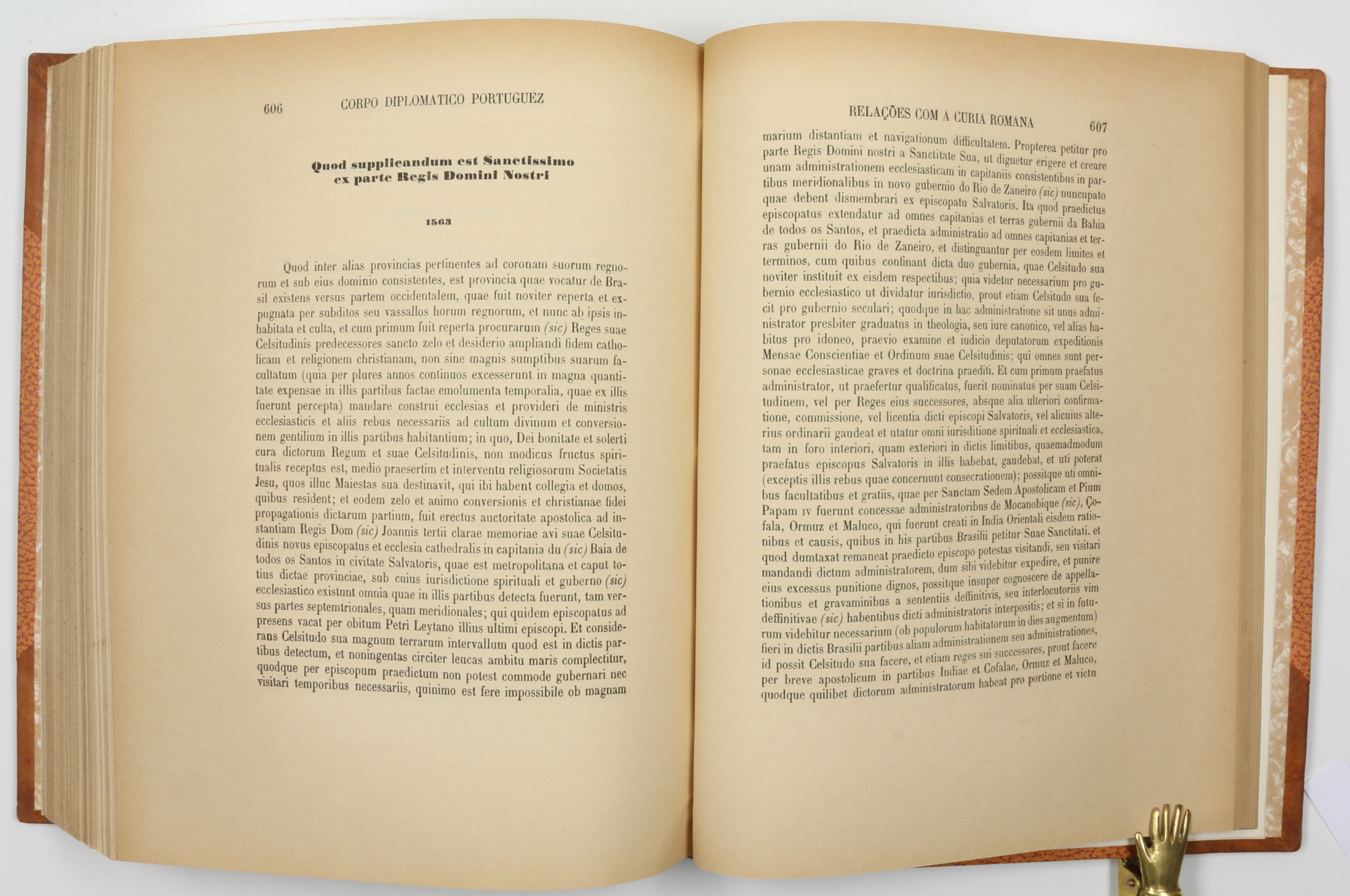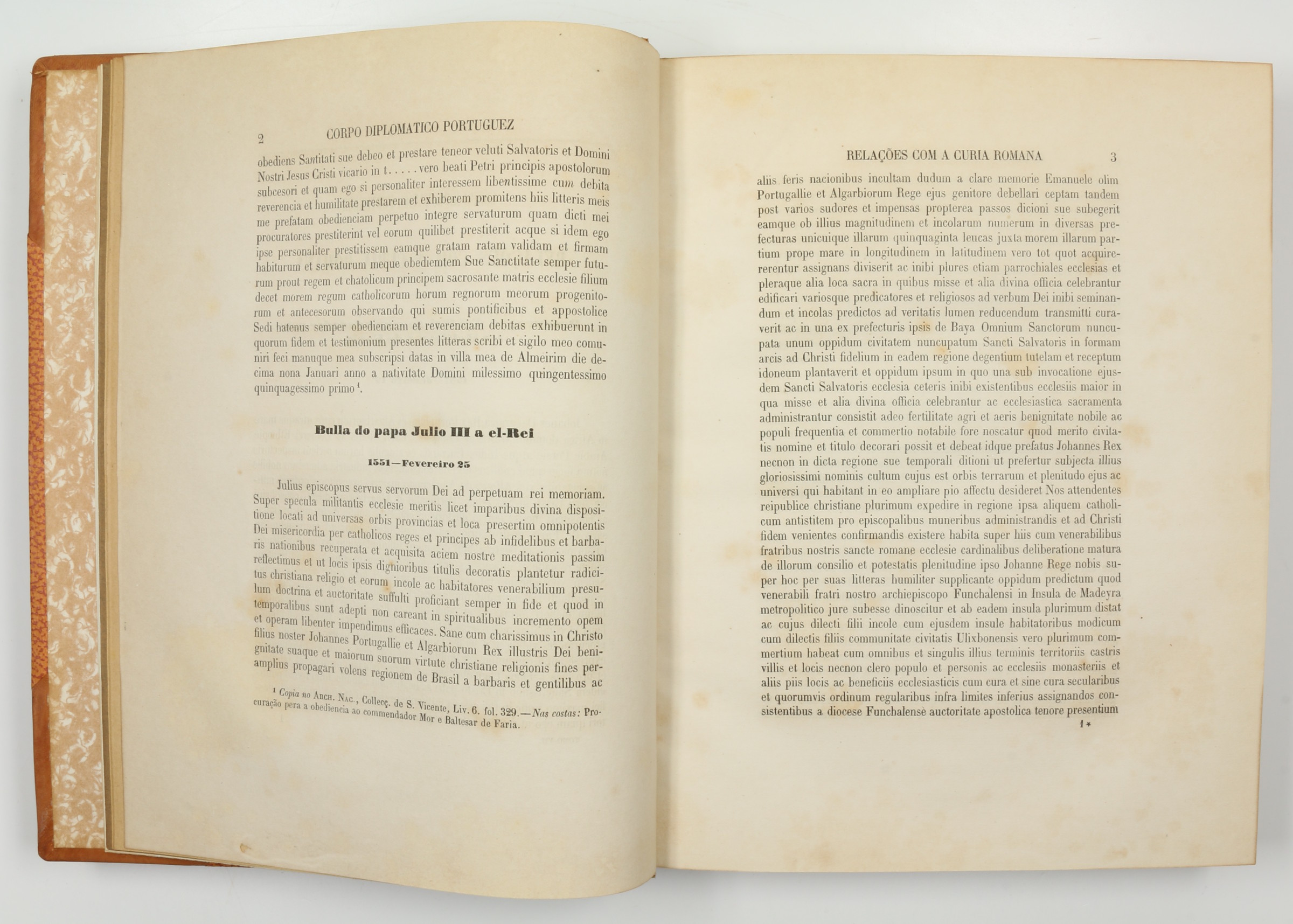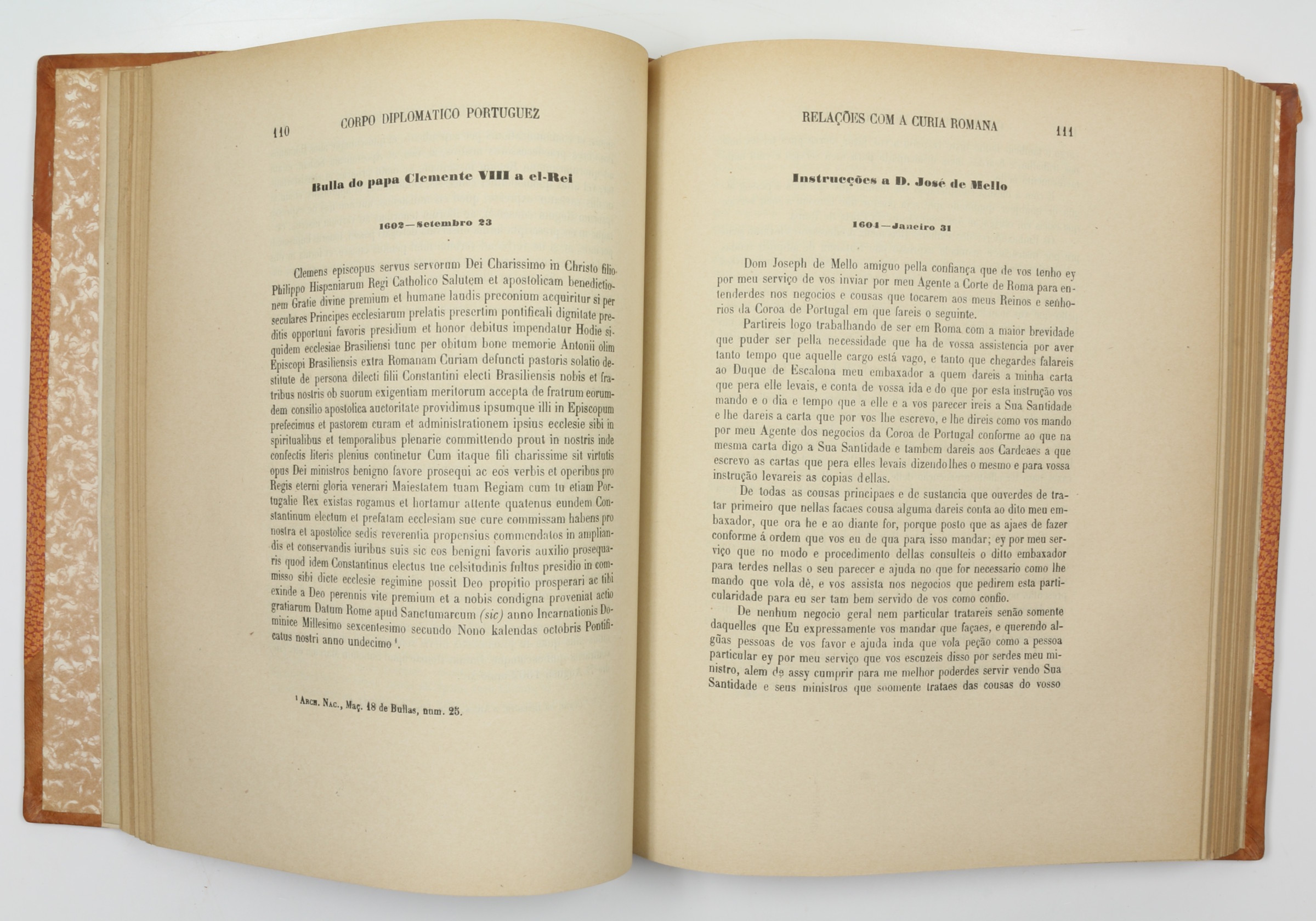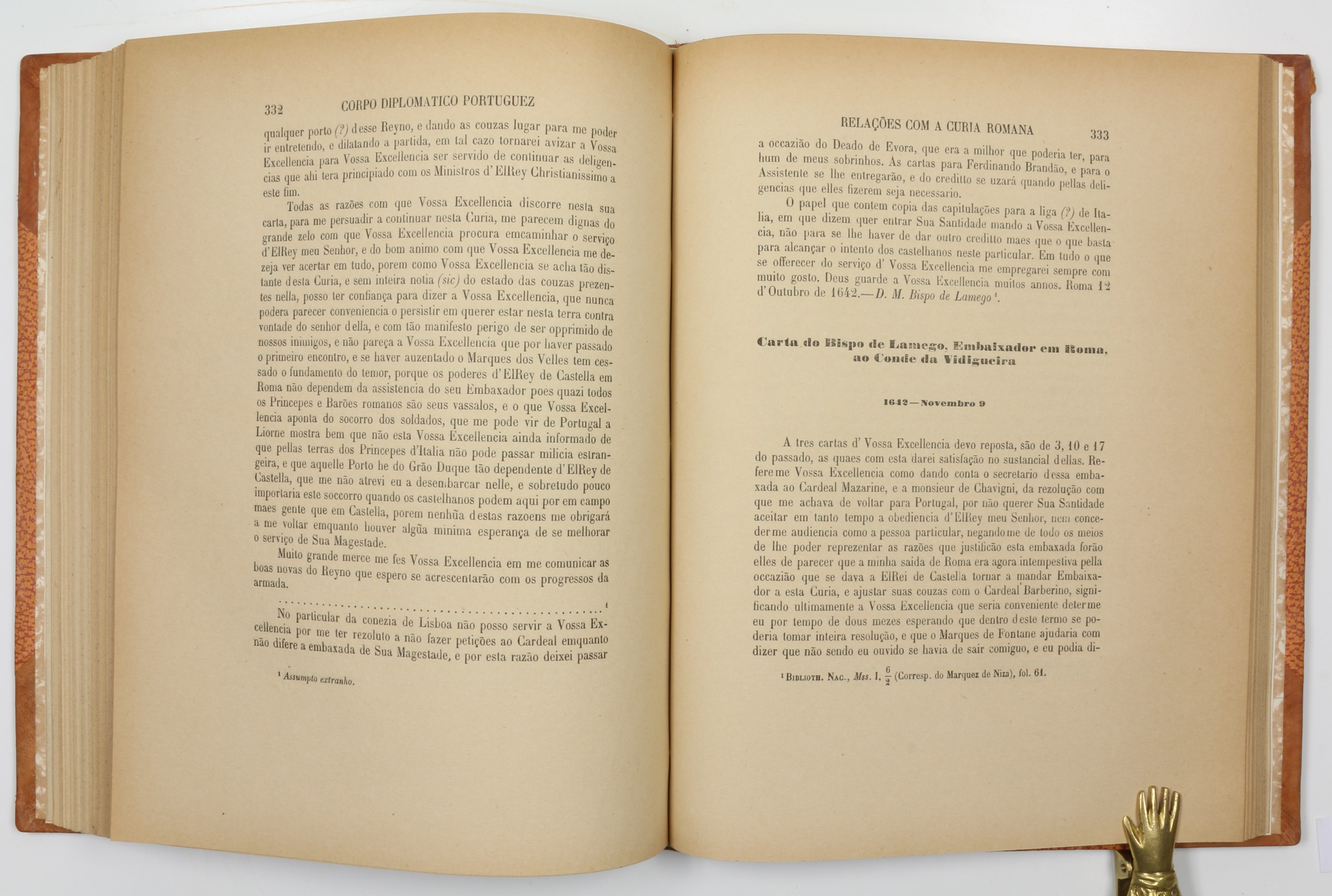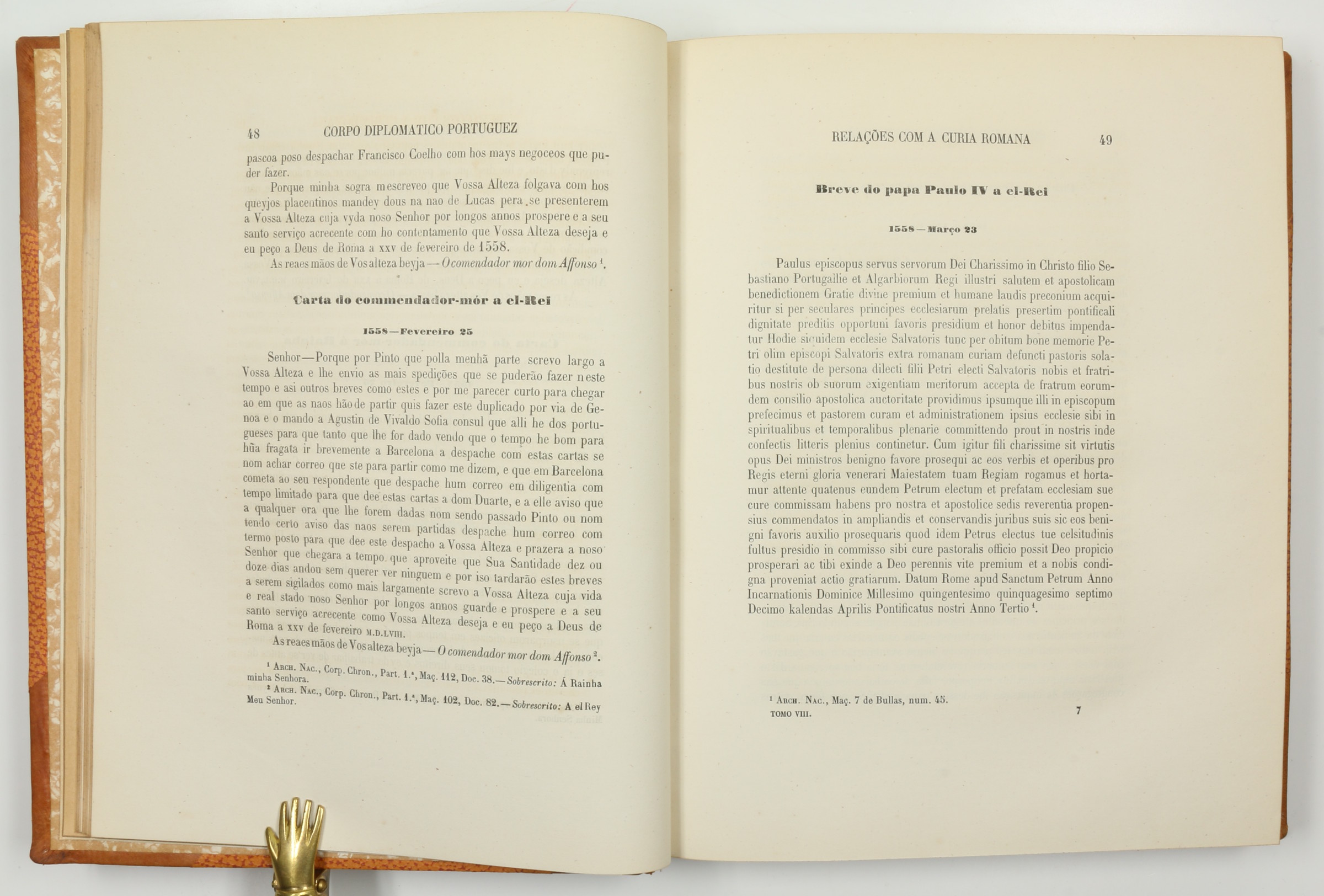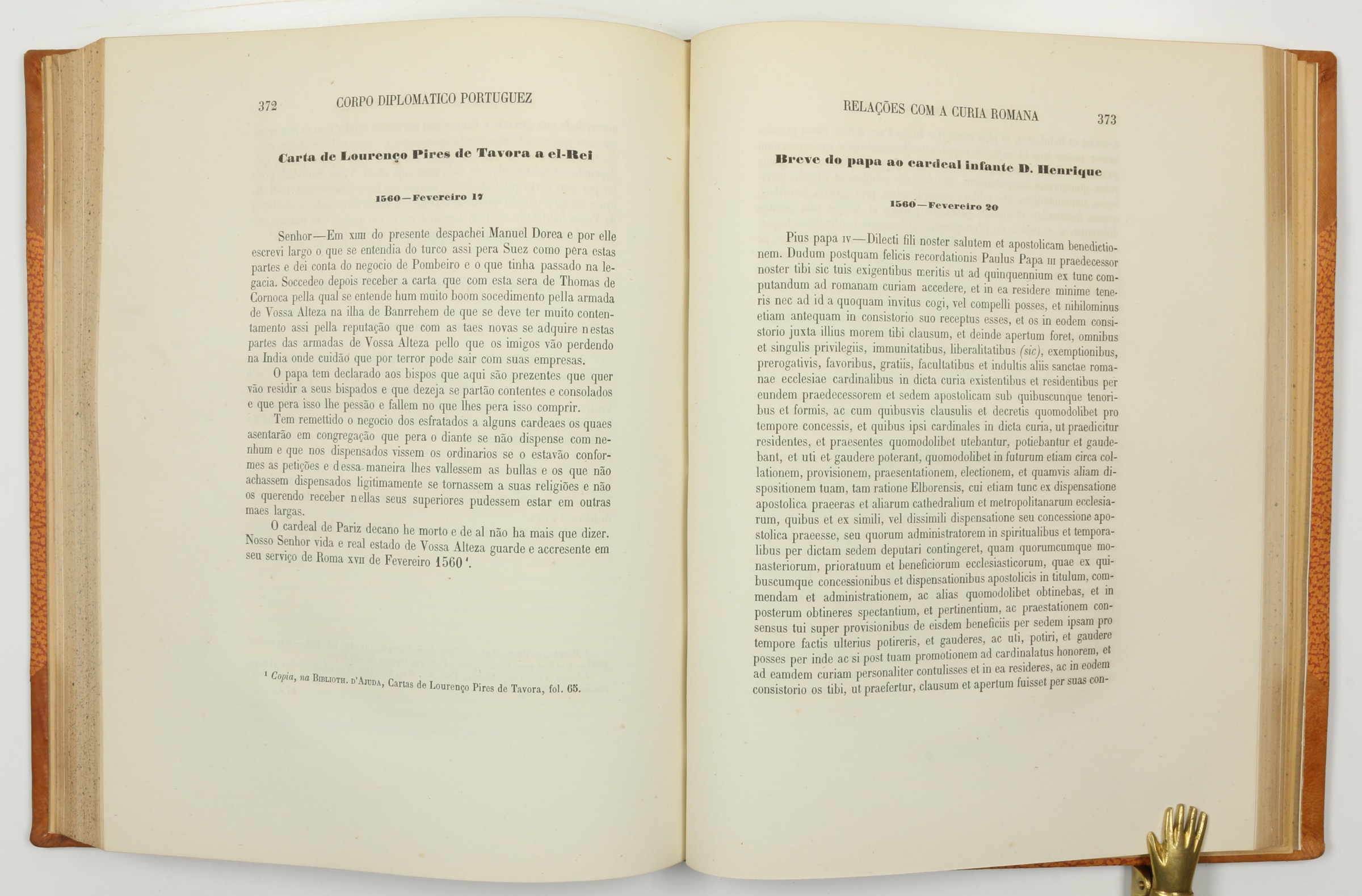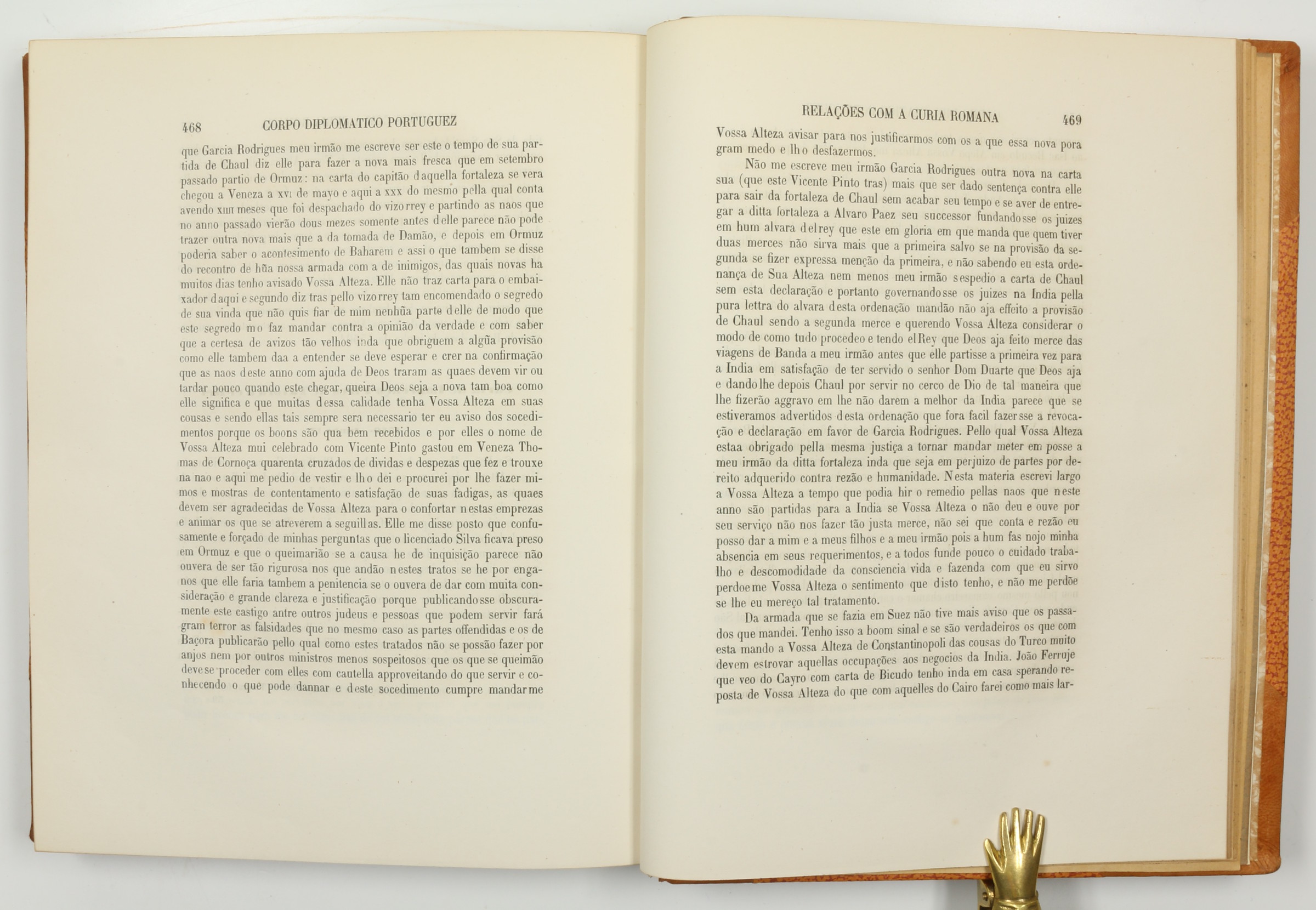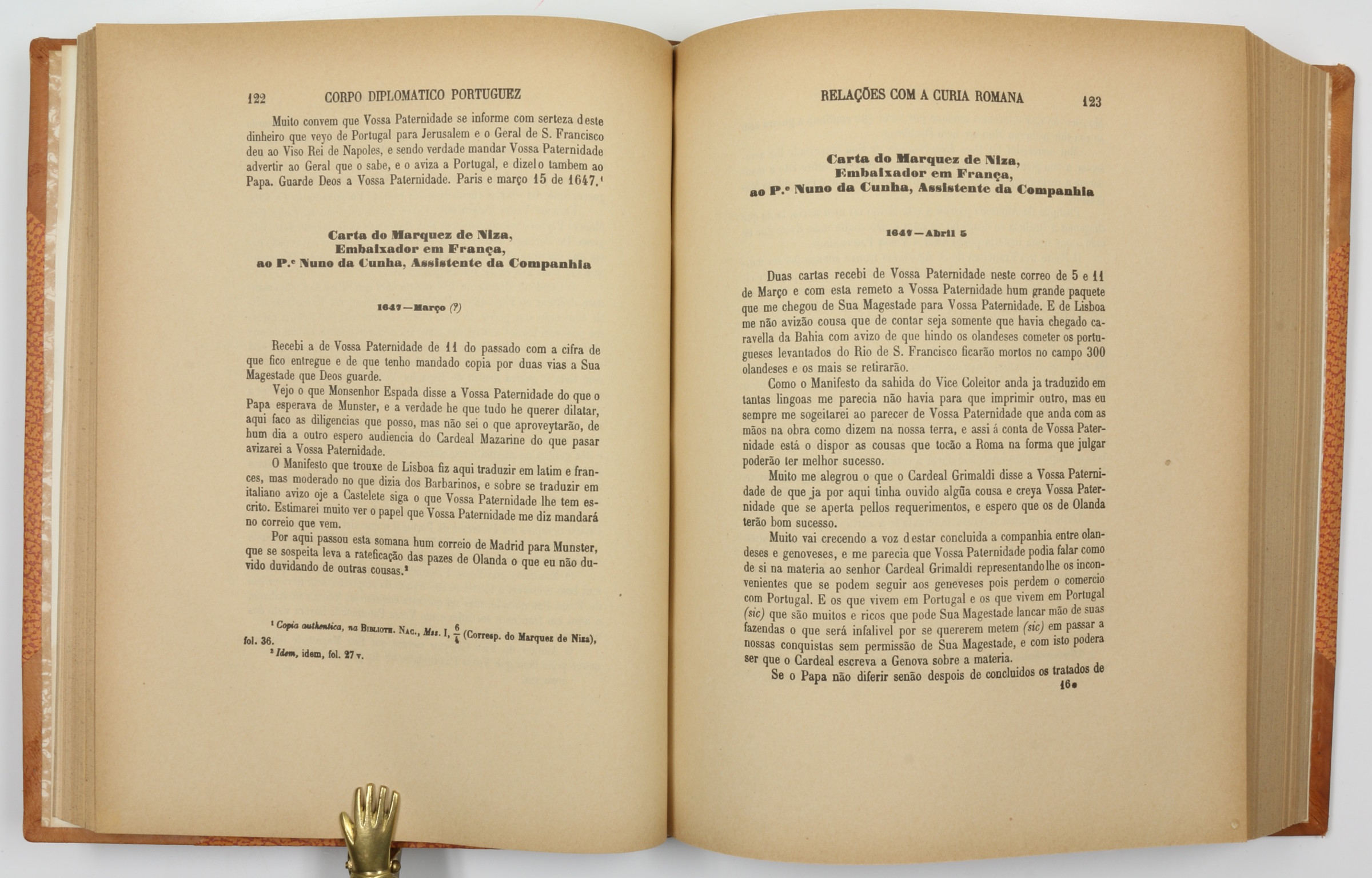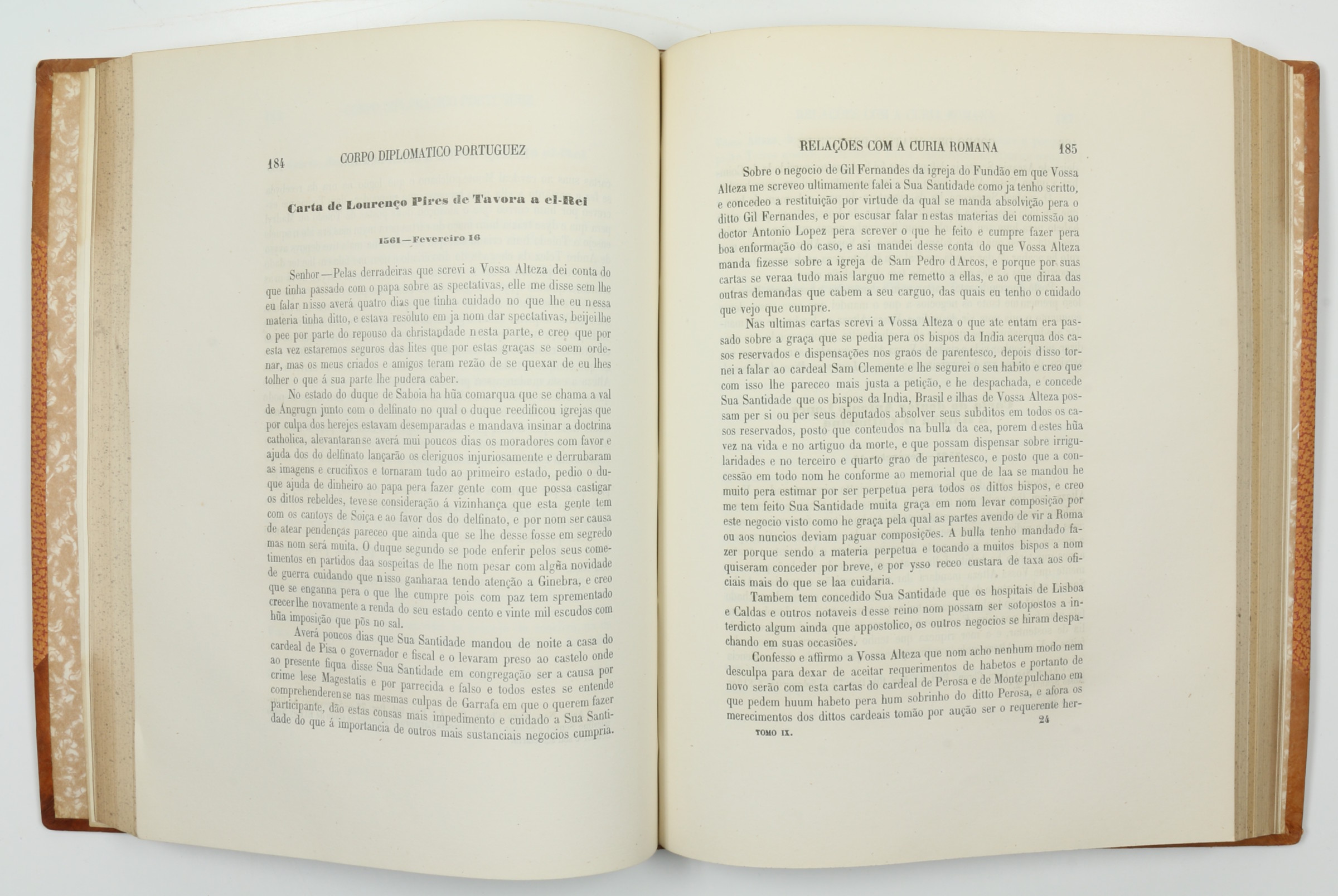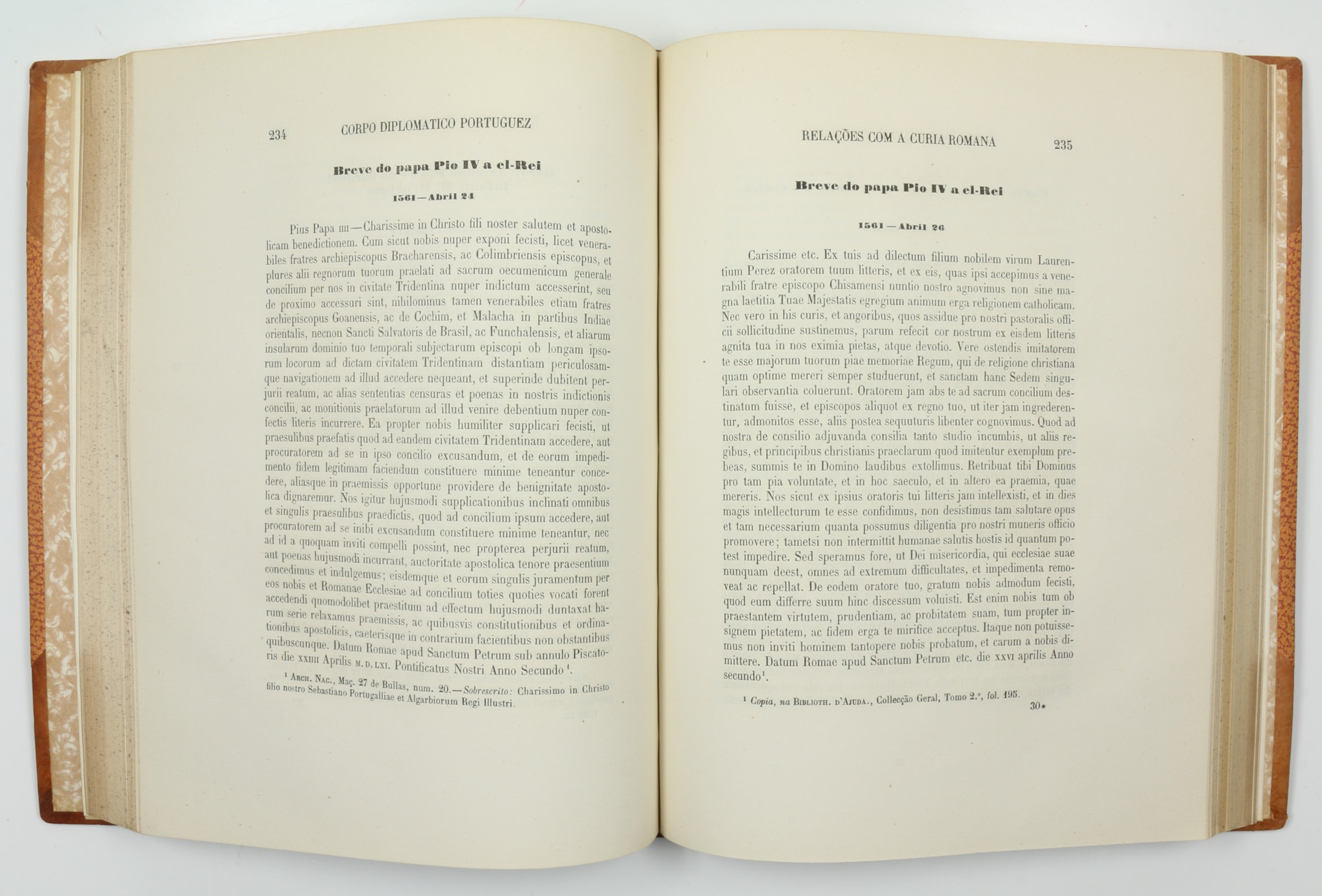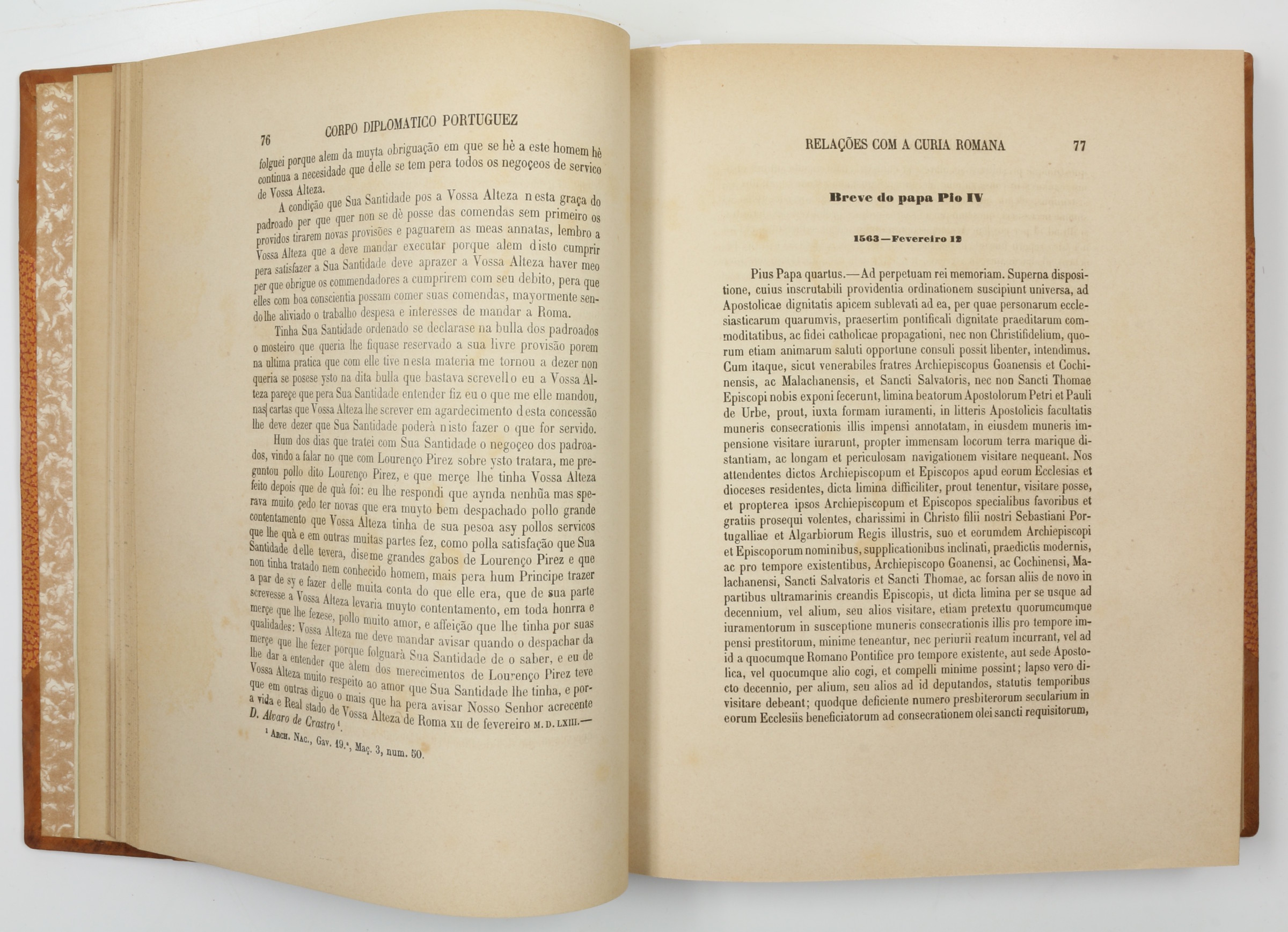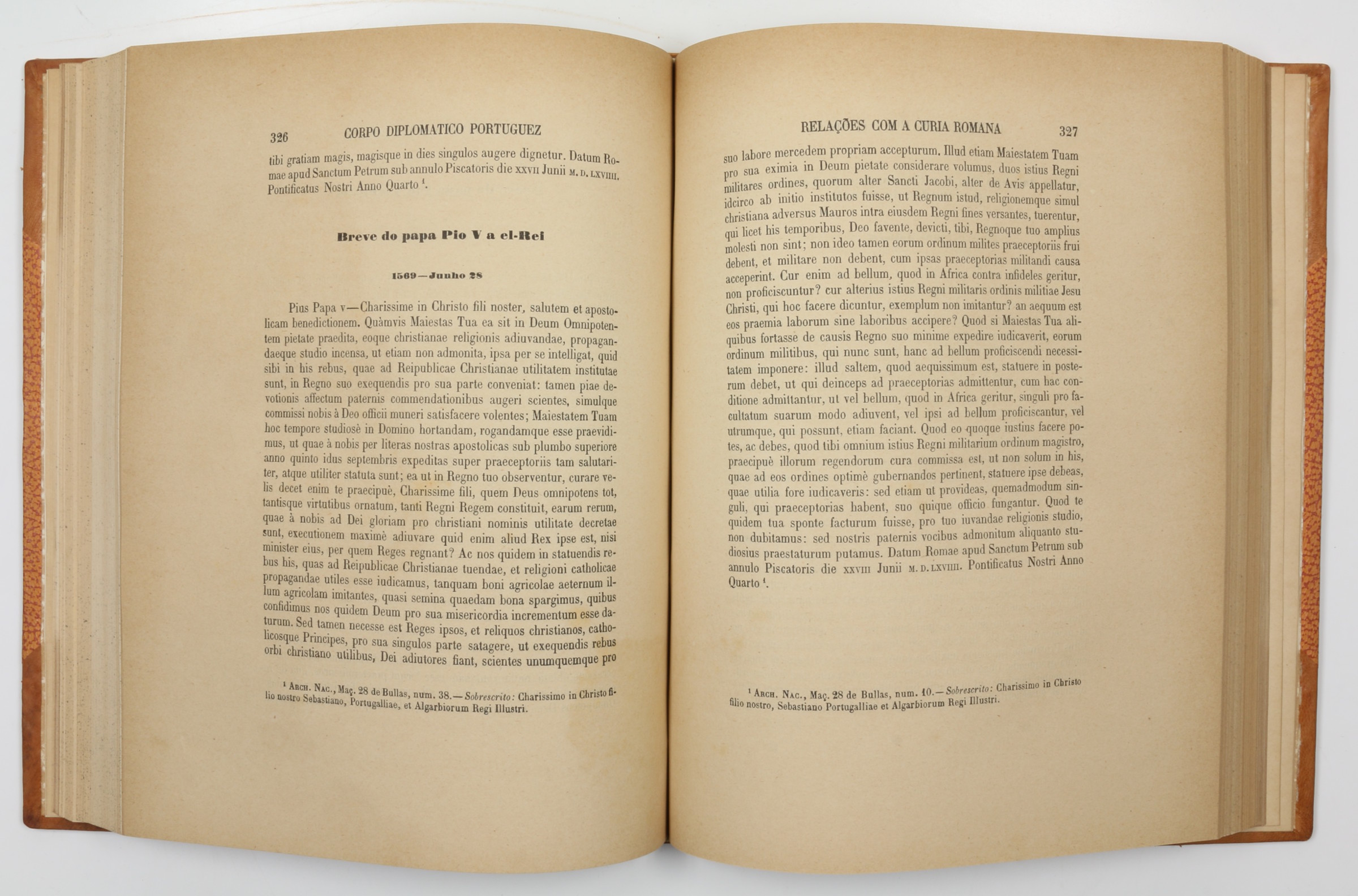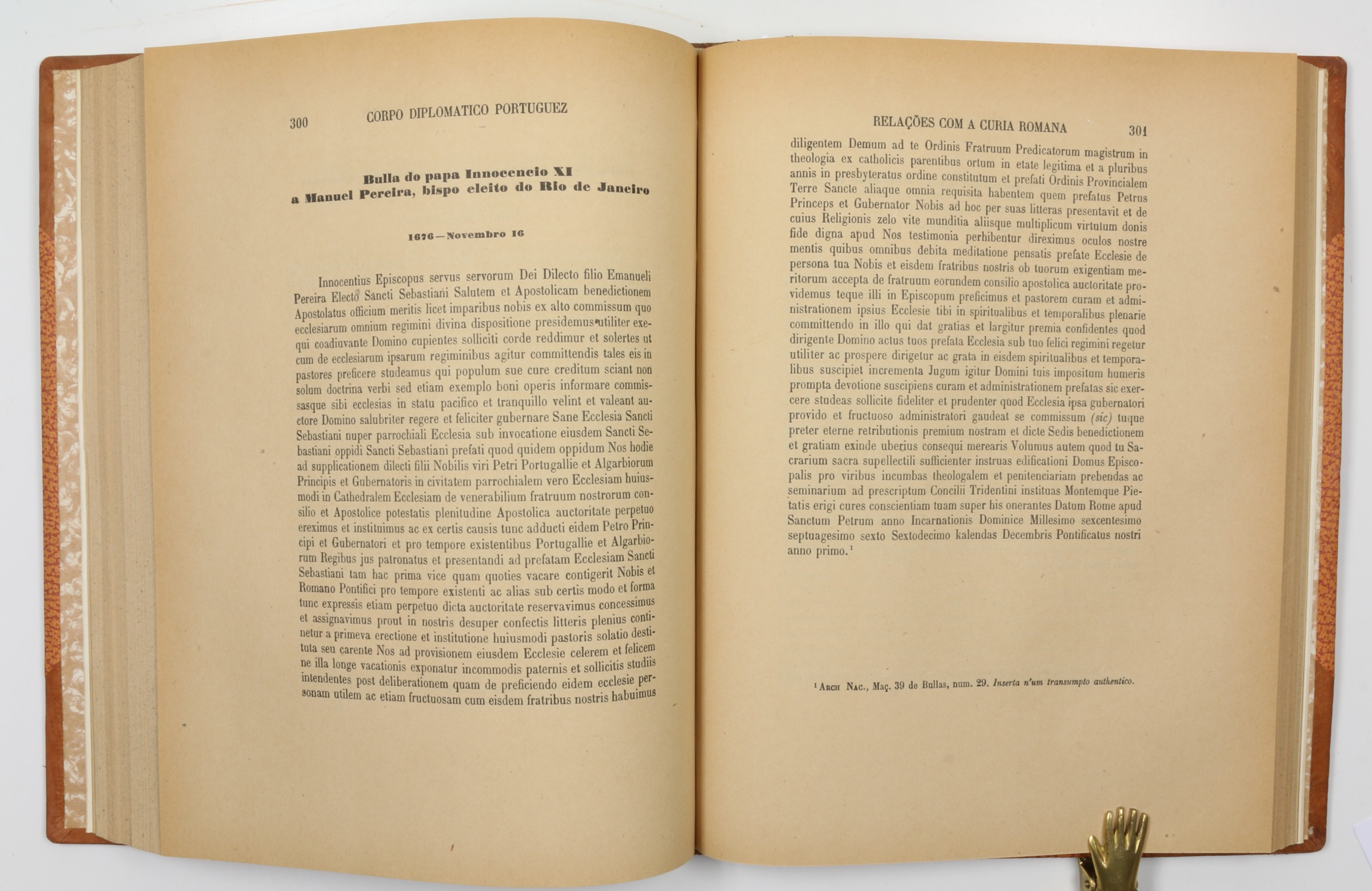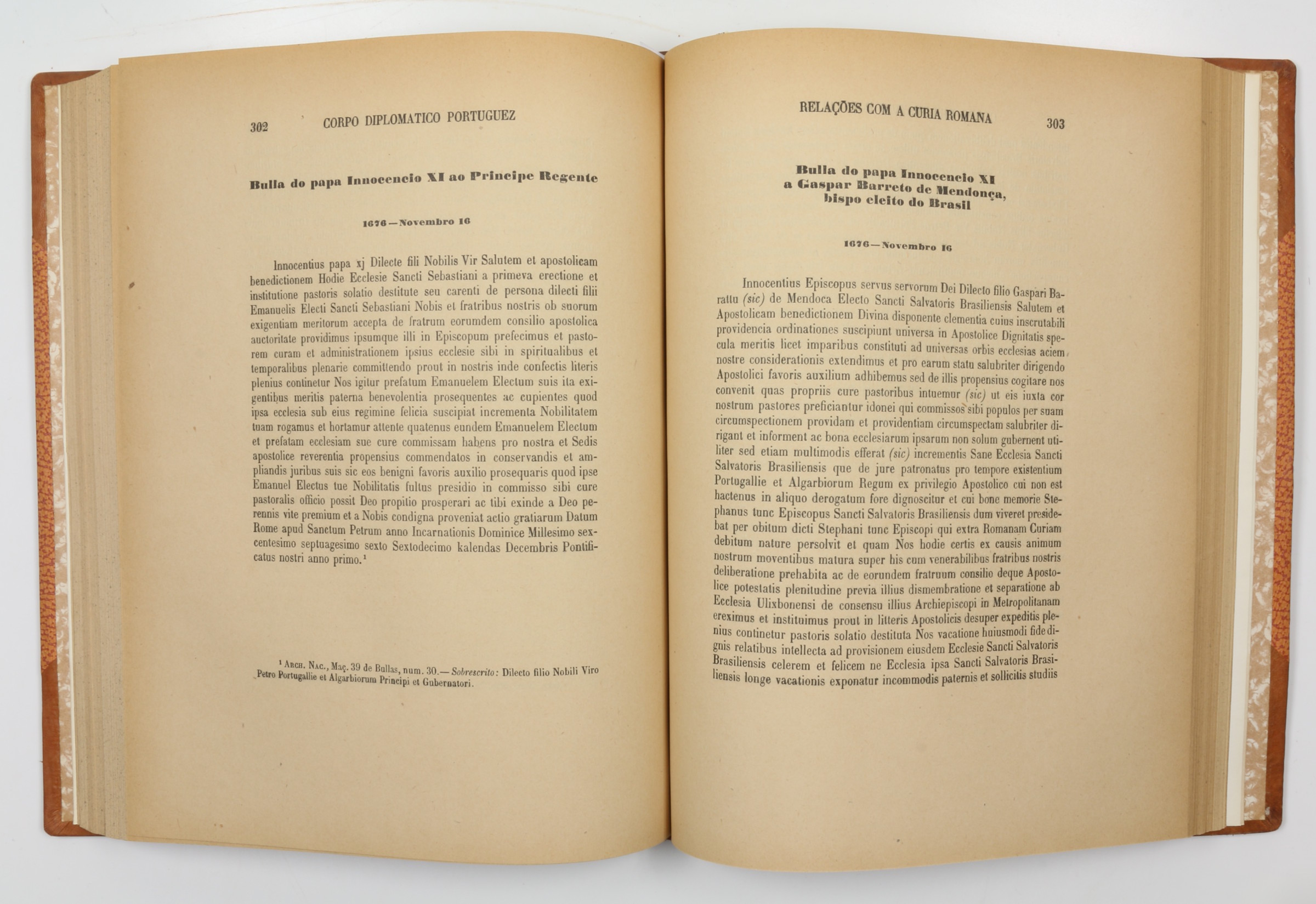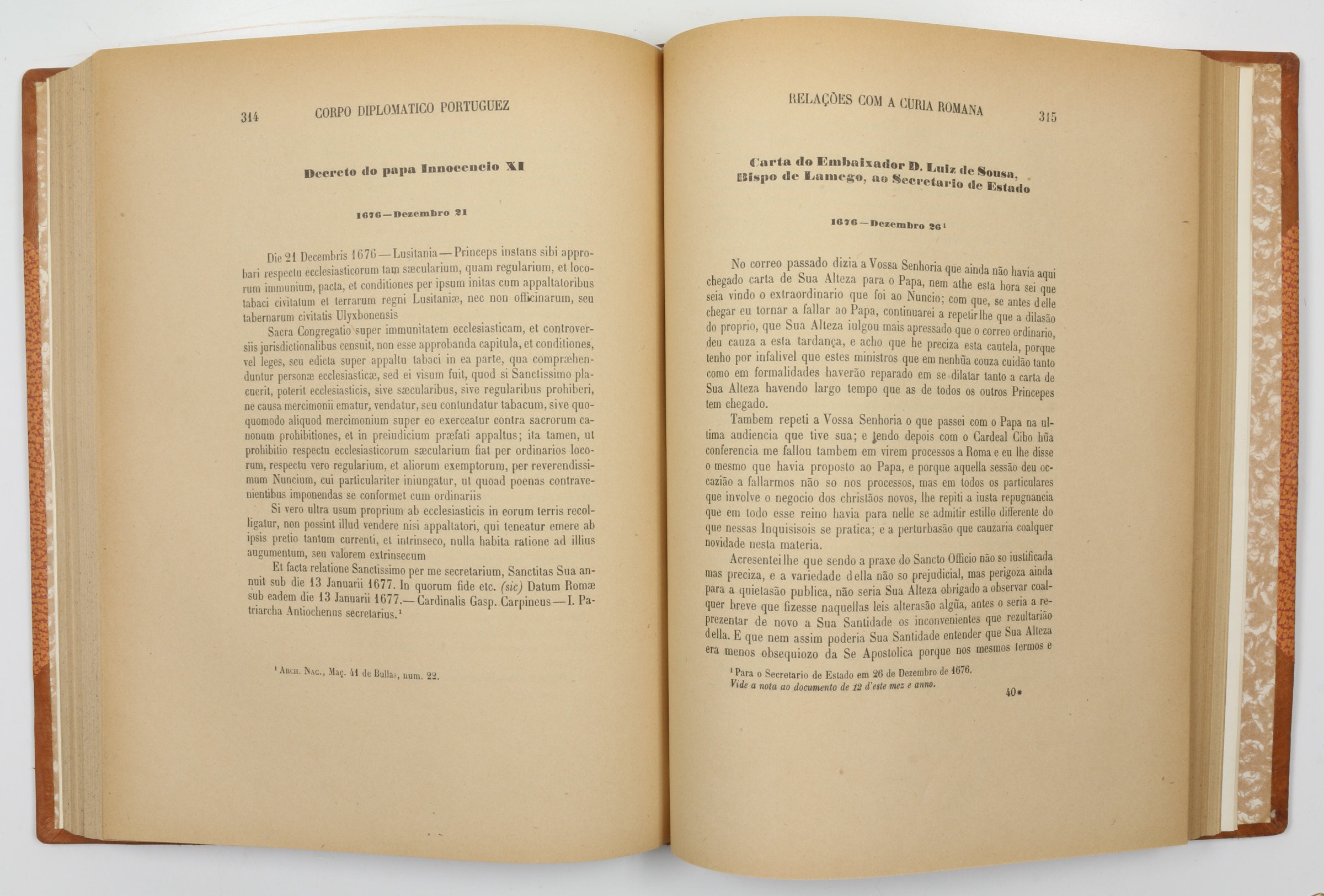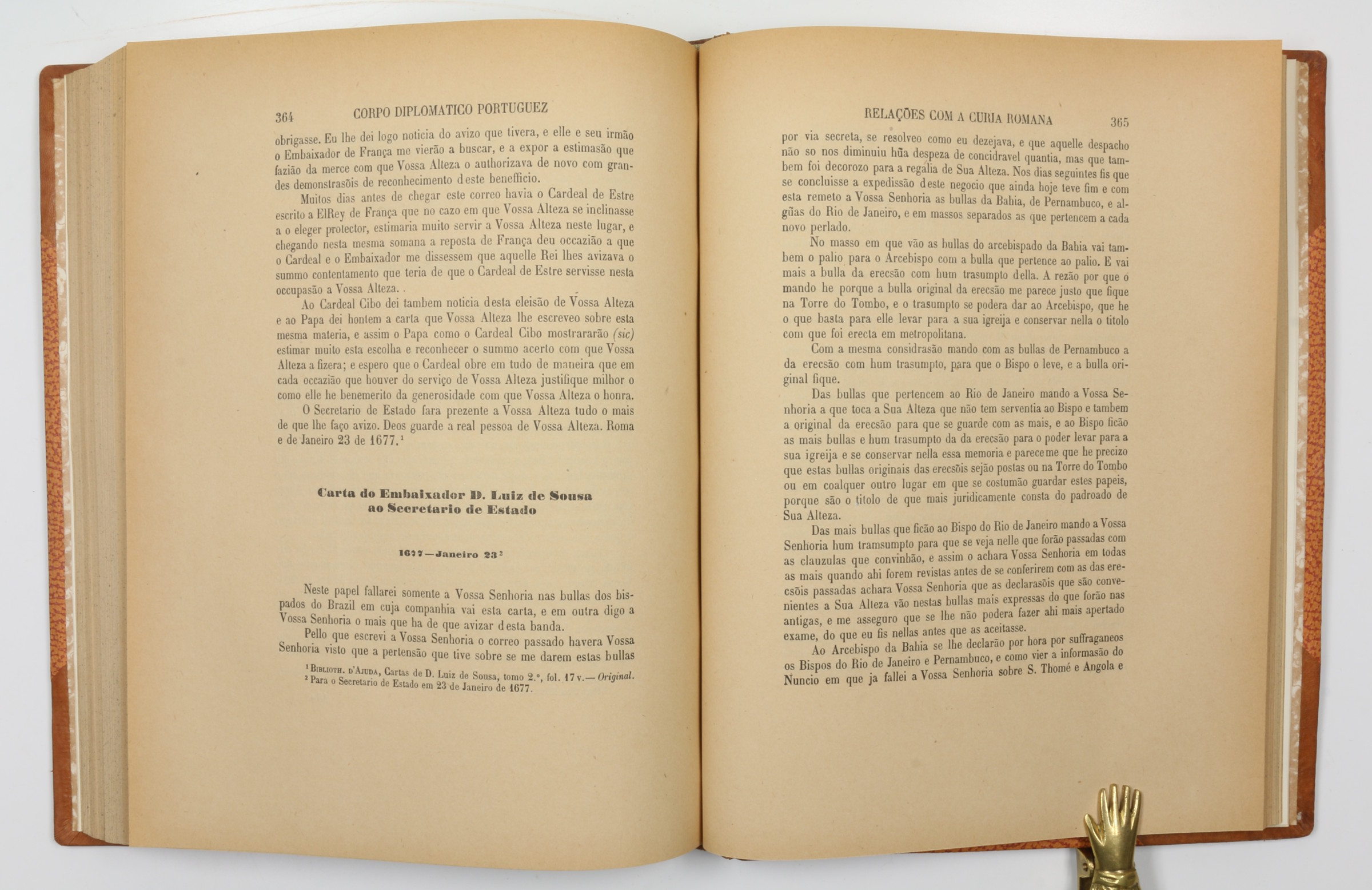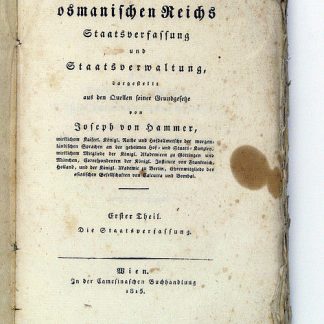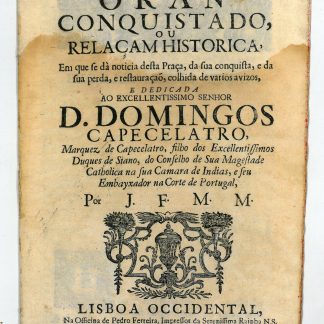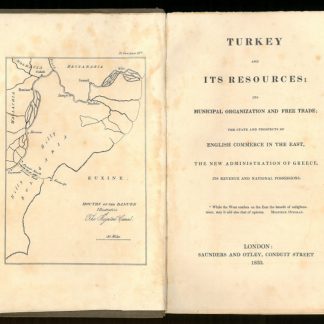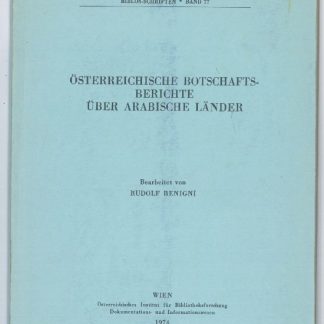Correspondence of the "Lord of the Naval and Commercial Conquest of Arabia, Persia, India and Asia"
Corpo diplomatico portuguez. Contendo os actos e relações politicas e diplomaticas de Portugal com as diversas potencias do mundo, desde o seculo XVI até os nossos dias.
Small folio (224 x 284 mm). 15 vols. (final vol. in 2 parts), uniformly bound in half tan sheep over decorated boards, spines gilt with raised bands in five compartments, decorated endleaves. Some original printed wrappers bound within. All edges sprinkled.
€ 18,500.00
First editions; all that was published of this massive project. The "Corpo diplomatico" deals with the relations between Portugal and the Roman Curia, presenting a chronologically arranged sequence of documents from the 16th and 17th centuries. The Portuguese Empire was the first global empire in history, and the sources here edited - frequently citing the significant Portuguese royal title of "King of Portugal and the Algarves, on this side of the sea, and on the other side in Africa, lord of Guinea and of the naval and commercial conquest of Ethiopia, Arabia, Persia, and India" - provide substantial information on the principal world issues and conflicts during that vast Empire's first era. Much of the diplomatic correspondence concerns conflicts between the worlds of Christianity and Islam: in one letter, King Manuel describes his attacks on and victories over the local Muslim rulers ("the Saracens are thrown into confusion"; "our men attacked and burned maritime towns belonging to the Saracens, situated on the mainland"; cf. vol. I, p. 116f.), and in a Papal Breve, Pius V praises the strengthening of the Maltese fortifications after the Great Siege of Malta ("erit opportunissimum adversus Turcas, et praedones Afros totius christiani populi propugnaculum", vol. X, p. 226). Many volumes, but VII through XI in particular, contain material on the Arabian Gulf (Basra, Bahrain, Muscat, and Ormuz): "Ormuz, que he cabeça de todo o Reino de Ormuz [...] e na dita Cidade de Ormuz fortaleza minha com muita gente de christâos portuguezes" (vol. II, p. 374); "o vejo, que se se faz guerra ao Turco e Vossa Alteza quer, sem despesa de quasi nada, o Egipto e Suria e Arabia seraom vossos" (vol. III, p. 243); "e asy mandou que se reteuessem todas as naos, que viessem da India a Judá e a Meca" (p. 397); "se entende hum muito boom socedimento pella armada de Vossa Alteza na ilha de Banrrehem [= Bahrain] de que se deve ter muito contentamento assi pella reputaçâo" (vol. VIII, p. 372); "e depois em Ormuz poderia saber o acontesimento de Baharem" (p. 468); "toda a costa de Melinde ate Moçambique e assi da outra de Adem ate Ormuz quererâo por alguma d aquellas tentar ardis [...] A Baçora vai tambem muita somma de especiaria" (vol. IX, p. 110f.); "O negocio he grave e de muita consideraçâo e em ser muita a somma da speciaria que vem pello mar Roxo ao Cayro e pello de Ormuz a Bacora" (p. 135); "Andre Ribeiro que com Joâo de Lisboa foi cativo em Mazcate" (p. 175); "creo tambem que elles lá ou nos quá nâo sabemps o que passa em Bacora porque se n aquella ilha creserem galees sem hirem do mar Roxo, como as que ali vierâo quando de caminho tomarâo Mascate nâo sey por onde viessem as outras" (p. 305); "pera o resgate dos portugueses que estam cativos no Cayro, e forom presos em Mazcate" (p. 382; cf. p. 485); etc.
Furthermore, there are reports on the Portuguese in Suez, Africa (including Angola, Mozambique, Guiné, Sofala, Morocco, Arguin, Cabo Verde, Congo, São Thomé, Ethiopia), Brazil (Bahia, Maranhão, Rio de Janeiro, Pernambuco), the Azores, India (in nearly every volume, including Goa, Cochin, Damão, Malabar), and the Far East (Malacca and the Moluccas, with a few sections on Macau, China, and Japan scattered in vols. X-XIV). The work also provides a wealth of detail about the Inquisition and "cristãos novos" (both discussed in almost every volume), the Jesuits (vols. V-XV), the Council of Trent (vols. VI-X), Protestant activity (particularly in England), the Restauração, the Dutch in Brazil, the wars with the Turks on land and sea, and the activities of D. Sebastião and St. Charles Borromeu, the Order of Malta, and Cardinal Mazarin. Among the most notable texts are Ambassador Martinho's 1533 letter describing the forces defending Christianity in India and Africa, Bishop Lourenço Pires de Tavora's account of monasteries in India in 1561, and 25 letters written by P. Antonio Vieira from 1671 to 1675 (vol. XIV).
Marginal spotting in vol. XV, part 1; last 5 leaves remargined. Very discreet library markings on rear pastedown of each volume. Overall a very good set.
Innocêncio IX, 95. OCLC 55783574.

